Key takeaways:
- Understanding specific grant criteria and aligning project goals with funder priorities significantly enhances the chances of success.
- Africa-Europe collaboration fosters innovative solutions and builds sustainable partnerships that extend beyond individual projects.
- Thoroughly researching grants and developing a clear, compelling proposal narrative are essential steps in the application process.
- Seeking feedback from colleagues and leveraging diverse team strengths can refine grant applications and improve their quality.
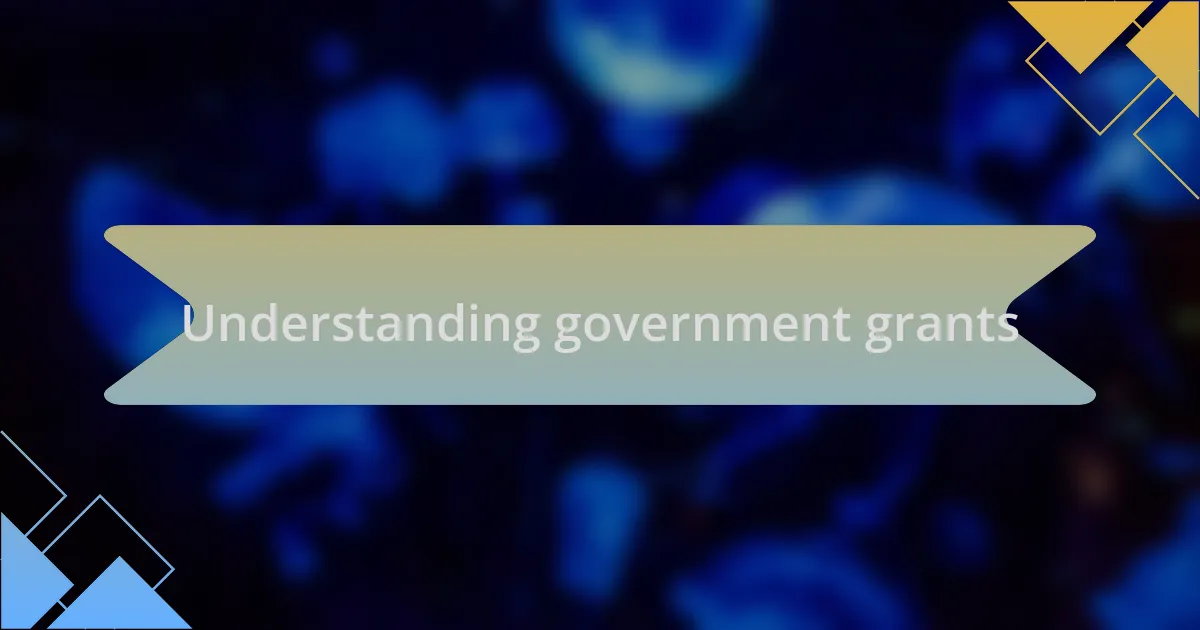
Understanding government grants
Government grants can feel like a complex maze, but understanding their structure is key. I remember the first time I applied for one; the intimidating application process made me wonder if I was even qualified. It was only when I took the time to break down each requirement that I found clarity, revealing how approachable the process can truly be.
Many people view grants as a financial lifeline, but they also represent a unique opportunity for collaboration. When I secured my first grant, it wasn’t just about the funds; it opened doors to work with brilliant minds across Africa and Europe. How often do we get the chance to contribute to something larger than ourselves while simultaneously advancing our own research?
Each grant comes with specific criteria and expectations that can vary widely. I learned to meticulously review these details, tailoring my proposals accordingly. This attention to detail not only strengthened my applications but also deepened my understanding of what funders are genuinely seeking in a project. Have you ever considered how aligning your goals with the funder’s priorities can increase your chances of success? I found that focusing on shared objectives made all the difference for me.
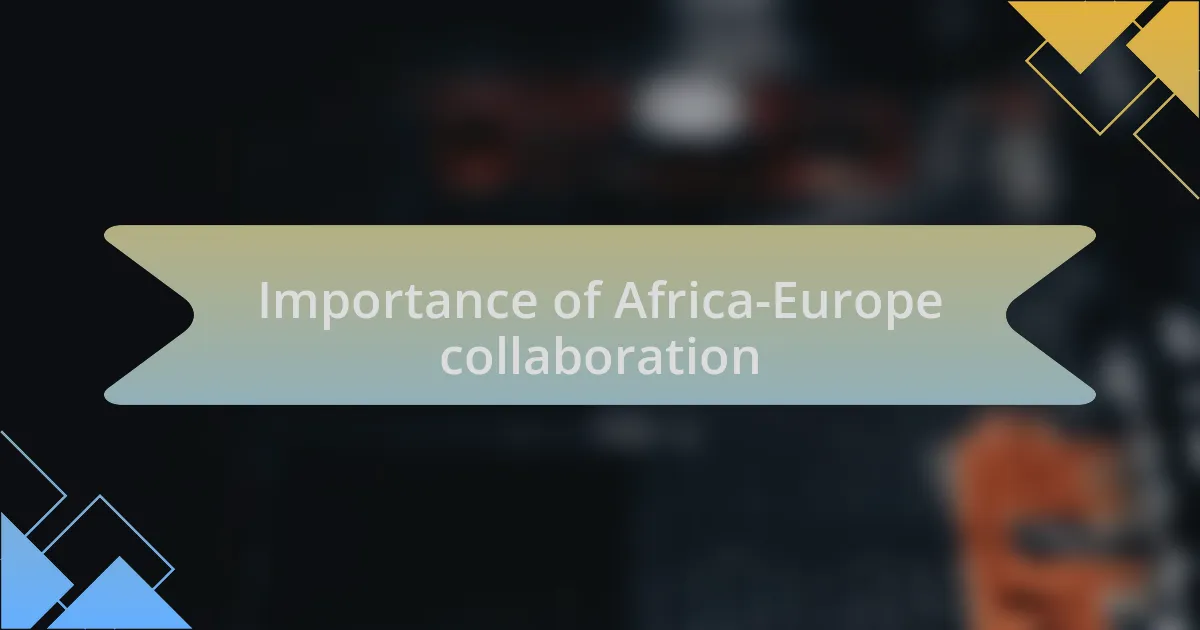
Importance of Africa-Europe collaboration
Africa-Europe collaboration is vital for addressing global challenges in science and innovation. I vividly recall a project where I teamed up with a European partner, and it was eye-opening to see how different perspectives lead to innovative solutions. Have you ever found that collaboration broadens your understanding in unexpected ways? In our case, we developed a research framework that neither of us would have imagined alone.
Moreover, this collaboration fosters a sharing of resources and expertise that can significantly enhance research outcomes. I remember pooling our strengths—from access to technology to specialized knowledge—and how it amplified the impact of our work. It left me wondering: how much more could we achieve if we embraced collaboration as a standard practice rather than an afterthought?
The connections made through Africa-Europe partnerships not only benefit individual projects but also lay the groundwork for sustainable development and policy improvements. I’ve witnessed firsthand how these relationships lead to long-term alliances that continue to bear fruit beyond the initial grants. Isn’t it fascinating how one collaborative effort can ripple outwards, influencing practices and ideologies across regions? It’s a powerful reminder of what we can accomplish together.
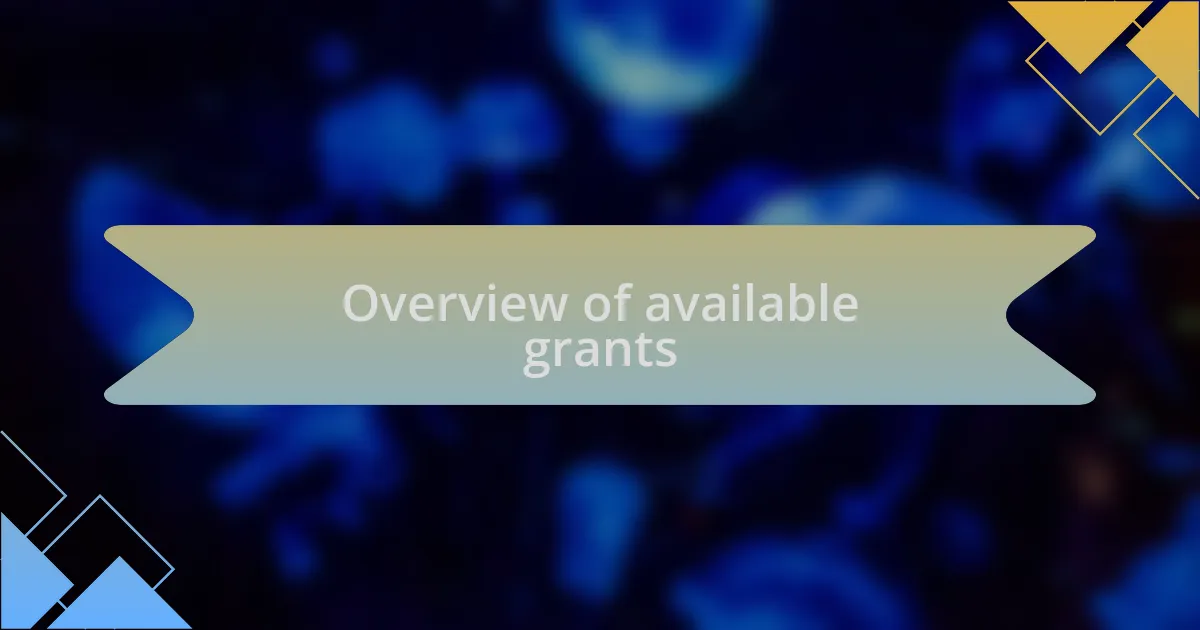
Overview of available grants
When exploring the landscape of available grants, I often feel a mix of excitement and curiosity. For example, programs like Horizon Europe and the African Union’s various research funding initiatives provide excellent opportunities for collaboration. Have you ever stumbled upon funding that perfectly aligns with your project vision? That moment can be exhilarating and validating.
Diving deeper, I recall navigating specific grants tailored for science and technology partnerships. One such grant I encountered required a clear articulation of how our project would foster innovation across both continents. Crafting that proposal was a process of discovery, as it pushed me to reflect on the unique contributions each partner brought to the table. How often do we really consider the diverse strengths our collaborators offer?
In my experience, the availability of grants often hinges on current global priorities, which makes staying informed crucial. I remember attending a seminar where emerging grant opportunities were discussed, shedding light on niche funding that I hadn’t previously considered. Isn’t it intriguing how a simple conversation can illuminate paths we didn’t know existed? Embracing this proactive approach to seeking out grants can be the key to unlocking collaborative success.
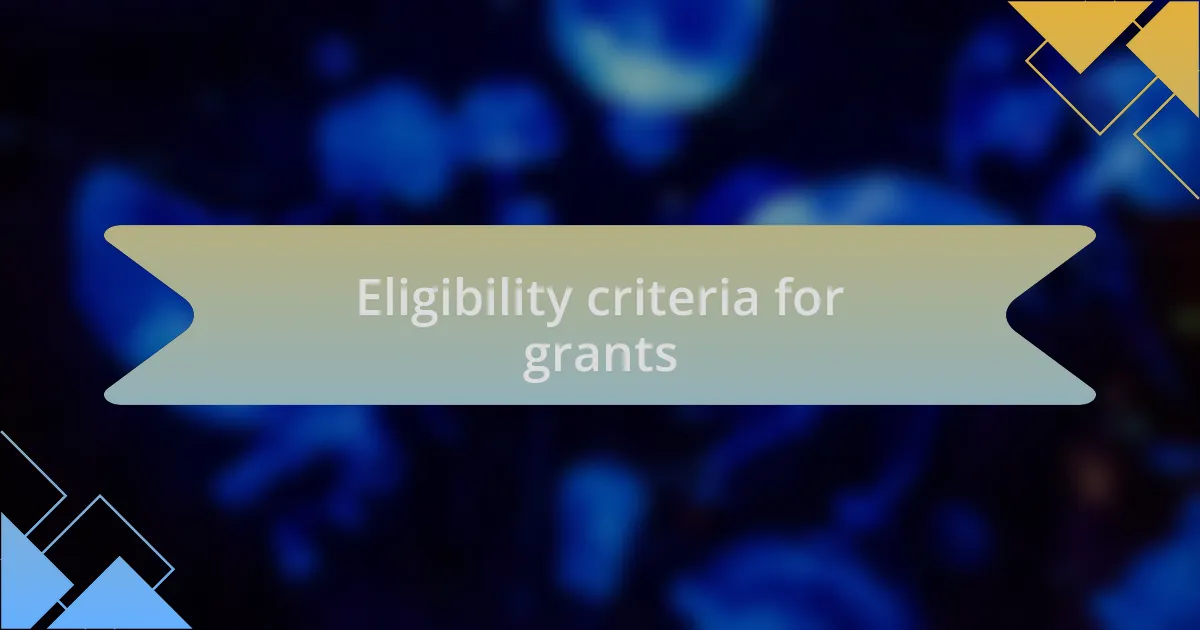
Eligibility criteria for grants
When assessing the eligibility criteria for various grants, I quickly learned that each program has distinct requirements tailored to its goals. For instance, some grants focus on specific research fields like health or technology, while others might prioritize collaborations between institutions from both Africa and Europe. Has there ever been a moment where you found yourself disqualified due to a seemingly minor detail? I can recall a time when a project thought it was perfectly aligned, only to find out that the lead institution didn’t meet the necessary criteria.
Another layer of eligibility often involves the experience and expertise of the research team. Often, grants will outline expectations for previous projects or publications, which can feel daunting if you’re just starting out. I remember feeling both challenged and motivated by a grant that required demonstrable success in prior collaborations. What a fulfilling moment it was to realize that my past experiences were the key to my future funding!
Lastly, geographical considerations play a crucial role in eligibility. Some grants specifically target institutions in certain regions or require that collaborative teams include members from both continents. During my journey, I once nearly overlooked a fantastic opportunity simply because I didn’t confirm the regional stipulations. It’s a reminder to always dive deep into the fine print; every detail can make a significant difference in your grant application journey.
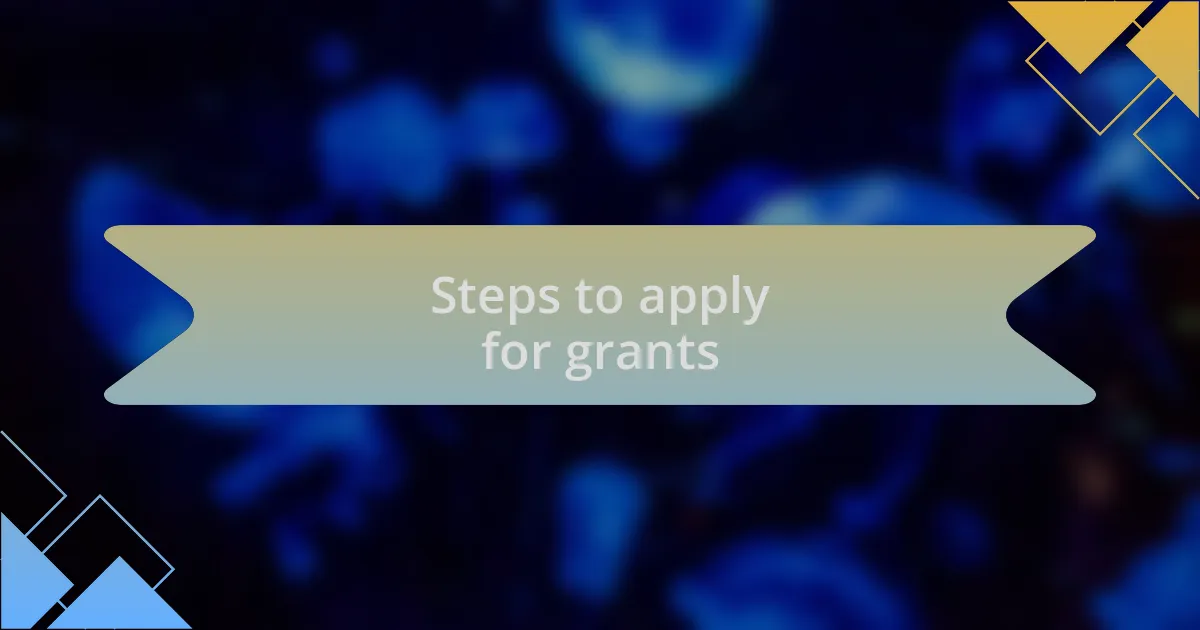
Steps to apply for grants
When I decided to apply for grants, the first step I took was to identify the right opportunities. I spent hours browsing various funding databases and websites, which can be overwhelming at times. Have you ever found yourself lost in a sea of options? I did, but eventually, I developed a systematic approach that involved categorizing grants based on both their focus areas and deadlines.
Next, I made sure to thoroughly read the application guidelines for each grant. At first, I skimmed through them, thinking I could get the gist quickly, but that led to unnecessary mistakes. One time, I missed a crucial requirement related to the project’s sustainability plan, which ended up costing me valuable time. I’ve learned that taking the time to digest these details provides clarity and significantly increases the chances of a successful application.
Once I understood the requirements, I focused on crafting a compelling narrative for my proposal. I recall how daunting it felt to articulate my ideas clearly and persuasively. To cope, I drew on personal anecdotes relevant to the project, highlighting how my passion for the topic and my experiences intertwined. This not only engaged the reviewers but also allowed me to showcase the project’s potential impact effectively.
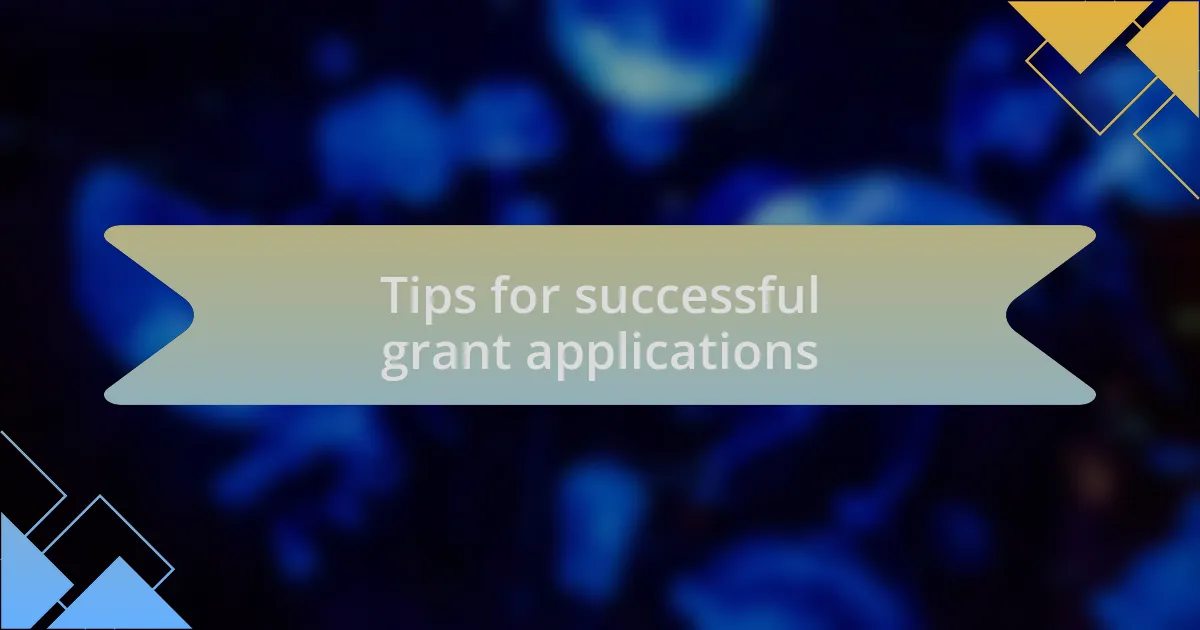
Tips for successful grant applications
Crafting a strong budget is crucial for any grant application. I remember facing this challenge firsthand. Initially, I treated it as a mere formality, but I quickly learned that a detailed and realistic budget can make or break my proposal. Why? Because it demonstrates that I had thoughtfully considered every aspect of the project, showing funders I was serious and capable.
One surprising tip I want to share is the power of collaboration. In my experience, bringing in a diverse team can significantly enhance the quality of my application. When I partnered with an expert in a related field for one grant, it not only strengthened our proposal but also added fresh perspectives that I hadn’t considered. Have you thought about who might complement your skills? Tapping into the strengths of others could elevate your project.
Lastly, don’t underestimate the importance of feedback. Before I submitted my applications, I sought out trusted colleagues for their insights. Their constructive criticism helped me refine my narrative and eliminate any ambiguity. I vividly recall a time when a friend caught a misalignment between my goals and budget that I had overlooked. This experience taught me to value external opinions; they can be invaluable in fine-tuning your proposal and enhancing its chances of success.

My personal experience with grants
Navigating the world of government grants felt like a daunting journey at first. I can vividly recall stumbling upon the plethora of requirements and expectations for one particular application. It was overwhelming, and there were days when I questioned whether I’d made the right choice in pursuing such funding. However, I quickly realized that perseverance and meticulous attention to detail were key; each document I gathered was a step closer to achieving my goals.
I encountered a pivotal moment during a grant writing workshop, where I found myself surrounded by like-minded individuals all eager to share their experiences. Listening to their stories made me feel less isolated. One participant recounted their own setback which led to a successful resubmission; it was encouraging and reminded me that failure can be a stepping stone to success. Has that ever happened to you? I learned that sometimes, sharing our struggles can foster a sense of community and collaboration, enriching our applications.
One particular grant application was especially close to my heart. It was focused on a project exploring sustainable energy solutions in my region. I poured my passion and purpose into that proposal, believing wholeheartedly in its potential impact. I still remember the thrill of receiving that acceptance email; it felt as if all the hard work had finally paid off. In that moment, I understood the profound importance of aligning personal values with project goals. How have your passions influenced your grant pursuits? For me, that connection was everything.